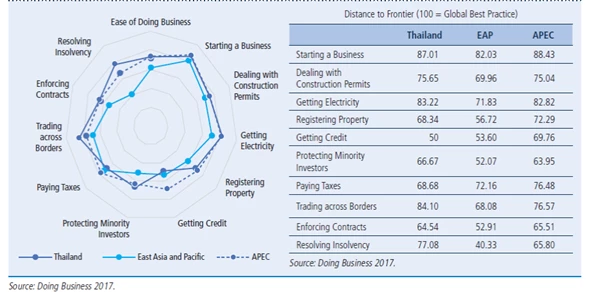
A Thai business owner in Chiang Mai might open a small resort serving local people as well as tourists. It would probably take him about two months to set up his business after finding the location, staff and getting the company registered. He would find it reasonably easy to start his business.
At the same time, a foreign investor living in Vietnam and considering whether to invest 3 million baht in Thailand to start a restaurant might have a different experience. She would likely find the process a bit complex and challenging. Most websites with the relevant information are written in Thai, the paperwork involved in registering a company can be pretty daunting for foreigners, and getting work permits and a business license can take longer than expected.
Thailand’s business environment plays a pivotal role in attracting private investment, both Thai and foreign, and these experiences could be reflective of many people’s sentiments in trying to set up a business here.
A strong business-friendly environment makes it easy for people to invest, start and run a business, and improves the competitive position of Thai businesses in global markets. It also benefits people. Small business owners, who create most jobs and are responsible for the well-being of many families in Thailand, gain. Consumers who can buy better goods and use services offered from more businesses gain as well as a strong business environment means faster, better, and cheaper services for people living in Thailand.
Thailand still has a good business environment by global comparisons, as measured by the World Bank Doing Business report, which measures the ease of doing business in 190 economies globally. Last year, Thailand ranked 46, retaining a spot among the top 50 economies for ease of doing business.

However, Thailand’s score has remained broadly flat in recent years while other advanced middle-income countries have been catching up or pulling ahead. Singapore has been in the number 1 and number 2 spot for many years. Improving the business environment further and attracting more investments will be critical for Thailand to increase its integration into regional and global value chains, become an economic powerhouse in the ASEAN region, and realize its vision to become a high-income economy.
Measures to ease starting a new business, accessing credit for small and medium enterprises (SMEs) to facilitating trade all go a long way to realizing the objectives laid out by the government. Recent critical reforms include an update of the Customs Act to international standards, which could shorten the time for clearance audits and investigations, as well as the introduction of an electronic ID system that would replace the need to present physical state certified copies to access public services, a significant simplification of bureaucratic requirements.
Thailand has undertaken key reforms aimed at simplifying starting a business and paying taxes. In 2016, Thailand introduced reforms that made business registration simpler by creating a single window for registering payments and started to provide credit scores to banks and financial institutions. It has made importing and exporting easier by introducing electronic submission of customs declarations. Further trade related reforms will be an important priority, especially as Thailand seeks to increase foreign investment in the country.
Thailand has now made further improvements in the business environment a top policy priority.
The Office of the Prime Minister and Ministry of Finance led the reform effort, under the leadership of Deputy Prime Minister Somkid Jatusripitak. They asked the Office of Public Sector Development Commission (OPDC) to serve as the coordinating body for all business environment reform efforts. The World Bank Group is pleased to support this important reform initiative and contribute to Thailand’s efforts to strengthen the business environment.
Work of the government’s Doing Business task force has focused, with World Bank Group support, on identifying key reforms to strengthen the business environment across ten areas: starting a business, dealing with construction permits, getting electricity, registering property, getting credit, protecting minority investors, paying taxes, trading across borders, enforcing contracts, and resolving insolvency. Most of the key reforms focus in particular on how to ease business entry and operation for SMEs, by reducing complexity, cost of regulatory processes, increasing transparency securing property rights, and increasing access to credit. Some of these reforms have already been introduced in the past month.
Reform actions range from short term measures that would include greater clarity in specific acts like the Business Security Act to help SMEs access funds to longer term measures such as completing the full implementation of the Thai National Single Window system for all agencies and categories of goods to achieve a fully paperless process for the clearance on import, export and transit goods.
Continuing these reforms to promote a better business environment are key for Thailand to realize its 20 year strategy and Thailand 4.0. They will not guarantee success, but they will help. In addition, implementing public infrastructure investments, developing skilled workers through quality education, and promoting innovations, will all be critical to improve the country’s competitiveness.
As Thailand makes it even easier to do business, Thai and foreign entrepreneurs alike – from a small Thai business owner to a foreigner living in Vietnam – will find Thailand an attractive place to invest. They will be able to bring capital, create more and better jobs, and help the Thai economy grow faster, resulting in higher incomes for more people to improve their families’ well-being and lives.
A version of this blog appeared in the Bangkok Post and Krungthep Turakij.


Join the Conversation